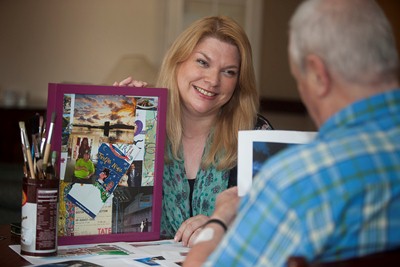
An ambitious scheme to unlock the memories of dementia sufferers is proving so successful it will be expanded into other care homes.
Sarah Edwards, artist in residence at Pendine Park, the Wrexham-based care organisation, has found ‘memory boards’ are helping clients, their families and staff at Bodlondeb, a home for those with dementia.
But Sarah believes they can be put to use in all the organisation’s homes, giving residents a personalised focal point which highlights important moments from their lives.
And she hopes her next big project will be to prepare personalised music CDs for each resident.
The project was launched in Bodlondeb, the award-winning centre of excellence for people with dementia that was officially opened by First Minister Carwyn Jones last year.
Bodlondeb is also pioneering an innovative musical collaboration with the world-famous Hallé orchestra.
Pendine Park’s long-standingpartnership with the Hallé has been honoured twice in three years at the annual Arts and Business Cymru Awards.
Sarah said: “We started the memory boards, which are A3 size and they contain a collection of images which mean something to the person, something from their lives, perhaps a wedding or other significant occasions.
“There is a twofold purpose, it helps the resident identify their bedroom by having pictures of familiar places or faces on their bedroom door. It is also great for memory and reminiscences and gives a sense of who that person is.
“We started it this year but we are now hoping to roll it out to the other homes,” said Sarah.
“We are all about trying to create a certain quality of life for residents and these boards create a point of interest which can give staff something to talk to them about. Even if it just raises a smile you have achieved something.
“Of course we rely heavily on family and friends to help with information and photographs. We have a person-centred approach to care and the memory boards can help in getting to know an individual’s life story.
“There is a lot of liaison between families, care staff and activities team. If it is possible we will include the resident in a session and they can help in the selection of items and in piecing together a map of their life. It is a very postive and rewarding experience for us all.
“It also gives the families a sense of involvement and we get to know a lot more about the resident’s history. What we include varies from person to person. On some boards we include perhaps a ticket from a special concert.
“One lady had written a poem to her mother on a scrap of paper. To many it would be an insignificant hand-written scrap of paper, but to her it was very important and meant a lot.
“The other project I have in mind for the future is a music CD. We have worked very successfully with the Halle orchestra to bring music sessions to our residents and we know the impact music can have.
“I thought it would be nice to create a personalised CD of music which again means something to the resident to give htem a chioice of what they listen to, music that means something to them as an individual.
“It can also help for someone to hear favourite music if they feel agitated.
“In our programme of training in arts awareness we are trying to make every moment count for the residents. Even the little things like putting a favourite piece of music on when a person is getting up in the morning can have an impact on their mood for the rest of the day.
Sarah, who has won awards for her innovative work, has been artist in residence for 16 years and is thought to be the first such appointment in the private care sector.
“Rolling out the memory boards is a big project, which will happen over the next 12 months and involve our care and activities teams.
“I suppose my job is unusual but it is unusual to have proprietors who are so supportive of the arts. They back whatever I want to do and it is nice to have that freedom of expression.
“At Pendine the arts are recognised as being a huge part of the care process and we want to continue to be able to tap into this and build on what we have achieved so far,” said Sarah.
Bodlondeb manager Ann Chapman is delighted with the success of the memory boards in improving the quality of life for residents.
She said: “Sometimes we are working with people who cannot communicate. The memory board can be of special events such as a wedding, perhaps pictures of their favourite pet or places which mean a lot to them.
“It has been very well received and works well. People recognise their own boards and can gravitate towards their own room. It gives them a sense of familiarity when they are sometimes lost in the fog of dementia.”
Caption: Artist in Residence Sarah Edwards working on a Memory Board with one of the residents.